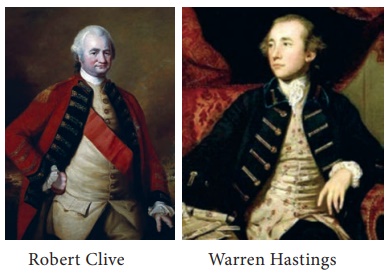Effects of British Rule - Establishment of British Raj | 11th History : Chapter 17 : Effects of British Rule
Chapter: 11th History : Chapter 17 : Effects of British Rule
Establishment of British Raj
Establishment of British Raj
Buxar was the real foundation battle for British
dominion in India. Not only the Nawab of Bengal and Oudh, but the Mughal
emperor ShahAlam II and his prime minister were also opposed to the British. As
a result of the Battle of Buxar, the Company ceased to be a company of merchants
and became a formidable political force. Under the pretext of corruption in
Bengal administration Clive was appointed Governor of Fort William. Clive did
not like his predecessor Vansittart’s decision restoring Oudh to Shah Alam. So
he called for fresh negotiation with Shuja-ud -daulah. As a result of this, two
treaties of Allahabad were signed. The emperor granted the Diwani (revenue
administration) of Bengal, Bihar and Orissa to the Company. The emperor Shah
Alam II was to get the districts of Allahabad and Kora, besides an annual
allowance of 26 lakhs of rupees from the revenues of Bengal, Bihar and Orissa.
The province of Oudh was restored to Shuja-ud-daula on the payment of war
indemnity. The treaties held the Nawab of Bengal responsible for the governance
of Bengal, Bihar and Orissa.

Before the emperor granted the Diwani to Clive, the
Nawab of Bengal, successor of Mir Jafar, had practically transferred the
Nizamat (civil administration) to the Company. So the Company had to function
as Diwan and the Nizam. The Diwan’s duty included the collection of revenue and
the control of civil justice. The Nizam’s function was to exercise military
power and to dispense criminal justice. Thus the Company acquired the real
power, while the responsibility of administration was with the Nawab. This
arrangement is called Dual System or Double government or Dyarchy.
But soon the dual system began to break down.
Governance without responsibility led to the outbreak of a terrible famine in
1770. Nearly one third of Bengal's population perished. The miseries of the
province were intensified by the Company servants who had monopolized the sale
of rice and realized huge profits. Finally, the Company realized its
responsibility and passed the Regulating Act of 1773. Warren Hastings was
appointed the Governor General of Bengal.
The administrative head of East India
Company was Governor (of Fort William or of Fort St. George) until 1772. Warren
Hastings who was Governor of Fort William was made Governor-General of Bengal
according to the Regulating Act of 1773. The Charter Act 1833 designated this
post as Governor-General of India and William Bentinck was appointed the first
Governor-General of united British India. The Governor-General was selected by
the Court of Directors of the East India Company, to whom he was responsible.
After the great rebellion of 1857, when the government of India was transferred
from the East India Company to the Crown, the title “Viceroy and
Governor-General” was first used in the queen’s proclamation of 1858. Canning
was the first Viceroy and Governor-General of India accountable to the British
Parliament.
Related Topics